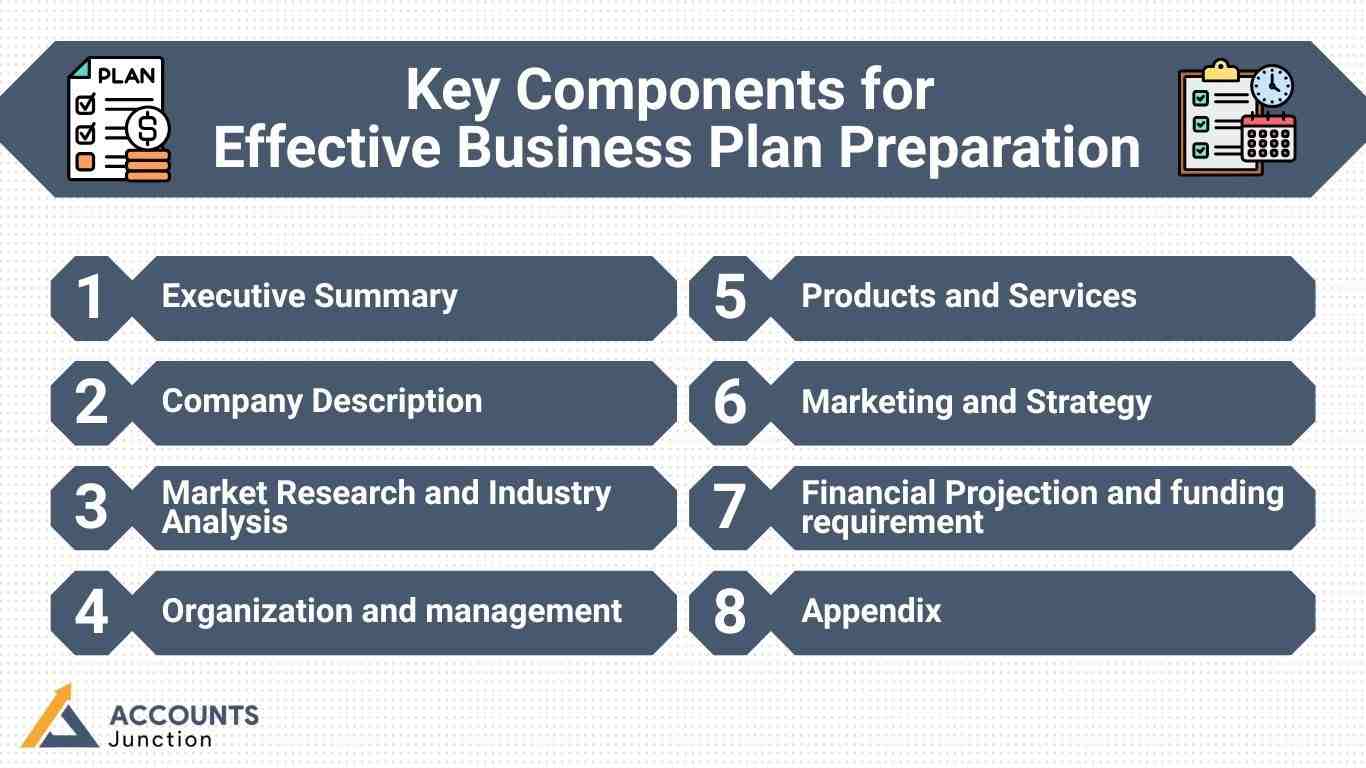
How to beat your competitors by doing Right Business Plan Preparation?
Business plan preparation is the first and critical step in turning business ideas into developing enterprises. It lays down a vision, strategy, and execution plan in a structured format. That will guide your journey toward success. A well-prepared plan, through proper business plan preparation, helps you gain clarity and reduce risk. This positions your business to outperform competitors. It is not just a document but a blueprint for smart decision-making and long-term growth.
Key Components for Effective Business Plan Preparation
A winning business plan development process includes several essential components that help you in defining your business strategy and guide execution.
Here are the essential elements:
1. Executive Summary
- This is the first and foremost section of your business plan. It provides a quick overview of your entire business, summarizing your mission, product or services, target market, and financial highlights. A strong summary will capture attention and convince readers to continue reading and reviewing your plan.
2. Company Description
- In this section, you are explaining who you are, what your business does, and what makes it different from your competitors. Mention details about the company's past history ( if applicable), your vision and mission, business structure( LLLC, corporation, etc), and long-term objectives.
3. Market Research and Industry Analysis
- Business plan preparation must include detailed research on the target market and industry landscape. This section covers the real opportunity of your business and shows how proper business plan preparation can define your position in the market.
4. Organization and management
- Here is an outline of your internal business structure. Businesses should mention information like ownership, leadership, roles, and responsibilities, hiring and execution plans. Organization charts are useful and especially show the reporting line and steam hierarchy.
5. Products and Services
- You should describe what you are selling or offering to your customers. Explain their features, benefits, and the competitive advantage of your product or service. This section shows how your offering meets a need or solves a problem.
6. Marketing and Strategy
- This section details how your plan attracts, retains, and engages customers. This includes sales channels, advertising plans, promotional tactics, and customer relationship management.
7. Financial Projection and funding requirement
- This section includes revenue, profit, and loss projections, cash flow statements, and break-even analysis. If you are seeking funding, mention how much you need, what it will be used for, and the expected return on investment.
8. Appendix
- This appendix provides supporting documents to enhance the credibility of your business plan. This may include resumes of team members, product photos, legal documents, customer testimonials, or detailed market studies.
Common Mistakes to Avoid in Business Plan Preparation
Even the most promising business ideas can fail if the plan of business plan is poorly constructed. While making a business plan, avoiding certain points and making assumptions weakens your strategy. Below are some mistakes that should be avoided:
Unrealistic Forecast
- Overestimating revenue and underestimating costs make your plan untrustworthy. Investors expect numbers baked by data, not guesswork.
Lack of market Understanding
- A common error in business plan development is failing to study your target audience and competition. Without solid market research, your plan misses insights and leads to poor positioning in the market.
Vague goals and Strategy
- While making a goal, avoid generic statements like “We want to grow fast” Apart from that, include specific goals, timelines, and measurable goals.
Ignoring Mistakes
- Many businesses show a perfect plan with no mention of risks. However, acknowledging potential risks and how you handle them shows foresight.
Poor Organization
- If a business plan is hard to read and lacks structure, it may be ignored. Format it professionally with clearly defined sections, headings, and consistent styling.

The Role of Professional Business Plan Services
Many entrepreneurs try to write their plans, but professional business plan preparation services can greatly improve the quality and impact of your strategy. Here is why hiring professionals is often worth to investment:
Expert Structure and Clarity
- Professionals know how to structure your plan for maximum impact. They ensure every section flows logically and presents your business in the best light.
Deep Market Research and Financial Insights
- Experienced consultants bring market intelligence and financial expertise to your business plan development. They help create accurate forecasts and strong points that attract investors.
Saves time and Stress
- Writing a comprehensive business plan takes too much time, research, and effort. Professional service frees you to focus on running your business while ensuring your plan meets industry standards.
Avoid costly mistakes
- Professional help to avoid pitfalls. Such as unrealistic projections or poor formatting. That can prevent your funding efforts or confuse stakeholders.
Customize Your Business Plan to Industry Trends and Competitor Analysis
One powerful way to strengthen your business is to personalize it based on real-time data and competitive insights.
1. Identify Current Market Trends
- To know where your industry is headed, use industry reports, research studies, and new updates. This could include engaging technologies, changing customer behaviour, or new regulations. Make your plan in a way that shows you are proactive and forward-thinking.
2. Conduct Competitor Analysis
- Study your competitors’ strengths, weaknesses, pricing strategies, and customer engagement tactics. This will help you identify gaps and position your offerings more effectively. Your business plan development should highlight how you differentiate from competitors.
3. Highlight Innovation and Adaptability
- If your product or service responds directly to a market shift or unmet need, showcase that in your plan. Investors and partners value businesses that stay ahead of the curve.
4. Align Goals with Market Demand
- Use trend data to validate your goals and offerings. For example, if there’s a rising demand for eco-friendly products in your industry, explain how your business plans to capitalize on that.
5. Update Regularly
- A static business plan quickly becomes outdated. Make it a habit to revise your plan in response to market changes, keeping it relevant and reflective of your business's evolving position.
Business plan preparation ideas are not just about writing your ideas on paper. It is about turning those ideas into a competitive advantage. With the right approach, you not only set a clear direction but also show investors and stakeholders you are ready to lead. Customize your business plan development to real data and industry trends so you can build a future-proof strategy. This puts you ahead of the competition.
At Accounts Junction, we help businesses develop actionable and data-driven business plans that align with their goals. Our expertise ensures your plan is not only strategic but also investor-ready, giving you the confidence to grow and succeed in a competitive market.
FAQ
1. What is business plan preparation, and why is it important?
- Business plan preparation involves creating a structured roadmap for your business. It may help you clarify strategy and attract investors.
2. How does business plan preparation give a competitive advantage?
- A strong plan highlights unique strengths and market positioning. It may help your business outperform competitors effectively.
3. What key components should be in a business plan?
- Components include executive summary, market analysis, products, strategy, and financial projections. Proper preparation ensures clarity and focus.
4. Can business plan preparation help secure funding?
- Yes, a detailed plan may convince investors of your business’s potential. Accurate financial projections make funding more likely.
5. How does market research fit into business plan preparation?
- Market research identifies trends, competitors, and customer needs. It may guide decisions and strengthen your strategy.
6. What role does competitor analysis play in business plan preparation?
- Competitor analysis may reveal gaps in the market and opportunities. It helps position your business uniquely.
7. Why should goals and objectives be included in a business plan?
- Clear, measurable goals may guide operations and track progress. Vague targets can weaken the plan’s impact.
8. Can professional services improve business plan preparation?
- Yes, experts may provide structured formats, deep market insights, and realistic financial forecasts. It may save time and errors.
9. How can risk management be integrated into business plan preparation?
- Identifying potential risks and mitigation strategies may make your plan credible. It shows preparedness to investors.
10. What mistakes should be avoided in business plan preparation?
- Avoid unrealistic forecasts, weak market research, and poor organization. These can reduce plan effectiveness.
11. How often should a business plan be updated?
- Updating may be needed when market trends or business goals change. Regular revisions keep your plan relevant.
12. Can technology tools support business plan preparation?
- Yes, financial modeling, project management, and research tools may improve accuracy. They can save time and enhance insights.
13. How detailed should financial projections be in a business plan?
- Projections may include revenue, cash flow, and break-even analysis. They help investors assess business viability.
14. Why is an executive summary crucial in business plan preparation?
- The summary may capture attention and highlight your business purpose. It often determines whether investors read further.
15. How can innovation be highlighted in a business plan?
- Show how your product or service meets emerging needs. Innovation may make your business more attractive to investors.
16. How do KPIs relate to business plan preparation?
- KPIs may track performance and progress toward goals. Including them shows a measurable and actionable plan.
17. Can customization to industry trends improve a business plan?
- Yes, aligning strategies with market trends may increase competitiveness. It shows investors that you understand the market.
18. Should a business plan address customer acquisition strategies?
- Yes, it may describe how you attract and retain clients. Clear strategies demonstrate a practical approach to growth.
19. How does proper organization enhance business plan preparation?
- A well-structured plan may communicate ideas clearly and professionally. Poor organization may reduce credibility.
20. Can business plan preparation influence long-term business growth?
- Yes, it may guide decisions, allocate resources wisely, and reduce risks. Effective preparation supports sustainable growth.
